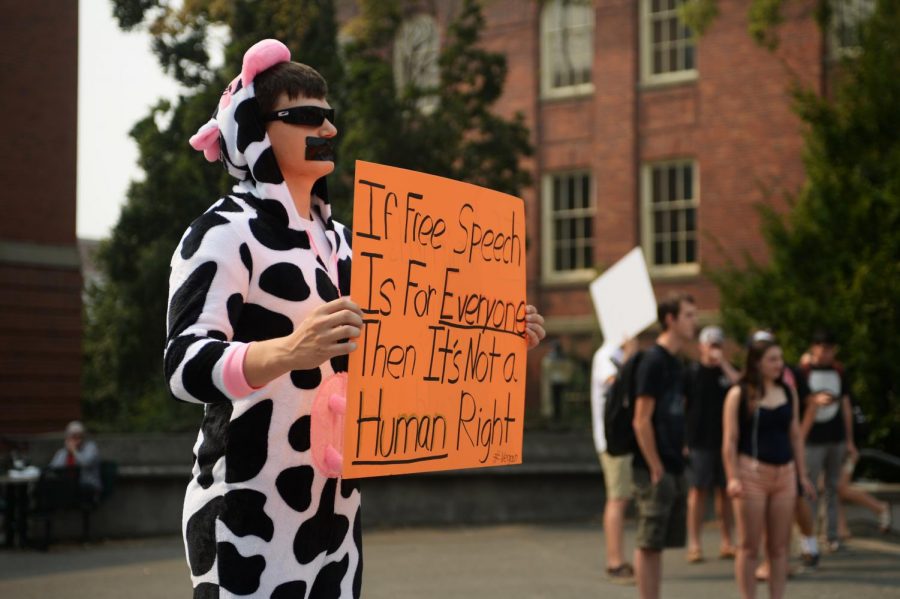Regulating speech cripples critical thinking
Shielding yourself from microaggressions doesn’t teach you to deal with them without safe spaces
JONI COBARRUBIAS | DAILY EVERGREEN FILE
Maintaining all aspects of free speech, including microaggressions, is the only way to preserve intellectual debate.
November 15, 2018
If universities regulate microaggressions, students may feel emboldened to be discourteous, thinking their behavior is justified in order to prevent further offense. The justification itself is nonsensical when the existence of substantial controversial thought is all but nonexistent in universities.
“Sticks and stones may break my bones but words will never hurt me” — a well-recognized saying that somehow lost its meaning to millennials. Inflated egos and self-righteous demeanors characterize this generation, causing some outsiders to perceive them as disrespectful and cultivating their expectation of vindication from others.
The logical consequence of this problem will be advocacy for microaggressive regulations in universities that evaluate the content of our speech not for its intent, but for its subjective effect on those who hear it.
Some students believe, however, that the punishment should be proportional to the crime and that the threat itself is likely to discourage inflammatory behavior.
“I think there should definitely be a form of punishment,” said Shazzy Vann, a junior political science pre-law major. “As far as regulating behavior, you should be able to talk to professors and student bodies for help when you face these kinds of issues.”
Many colleges have already begun to move in the direction of microaggression regulation with the implementation of policies that segregate and ostracize controversial ideas.
“Numerous schools … have Safe Zone and Safe Space programs in place that train students, faculty members and administrators to be special allies to LGBTQ and other groups,” according to USNews.com.
Regulating speech on university campuses to end microaggressive behavior has always been quite puzzling to me considering the homogeneity of our political environment.
A 2016 study examining the professors of the 40 leading U.S. universities in the fields of economics, history, journalism/communication, law and psychology revealed a Democrat to Republican ratio of 11.5 to one, according to a study conducted by Econ Journal Watch.
Reprimanding, requiring sensitivity training and in extreme cases expelling students who represent controversial opinions on university campuses seems illogical when there are disproportionally more people at the university who tend to agree with the majority of students.
Further research yielded evidence suggesting students shift toward the ideals of the majority on university campuses over time as well.
From freshman to senior year, students shifted their political views on issues by an average of 9 percent. There was actually a decrease in conservative perspectives in the same period of time by an average of 6 percent, according to an article in The Atlantic.
In a one-sided higher education system, students develop in a like-minded community. A heightened level of sensitivity ensues, making any degree of opposition intolerable. I have personally always believed everyone is entitled to have opinions no matter how idiotic or thoughtless they may be.
The best way to know if you truly believe something is to defend it by constantly challenging your beliefs in a variety of circumstances. Students should take courses that offer a Socratic seminar style of teaching or participate in organizations that are politically inconsistent with their own.
Forcing others to think as you do or only vocalizing ideas in furtherance of your own beliefs is self-defeating and unreflective of the real world. Students should advocate for more controversial thought and pit themselves against those ideas. An echo chamber is the death of critical thinking and decency toward others.
Strive to be the student who finds the flaws in others’ arguments rather than the student who shies away from debate altogether.






















